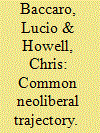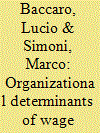|
|
|
Sort Order |
|
|
|
Items / Page
|
|
|
|
|
|
|
| Srl | Item |
| 1 |
ID:
109158


|
|
|
|
|
| Publication |
2011.
|
| Summary/Abstract |
Based on quantitative indicators for fifteen advanced countries between 1974 and 2005, and case studies of France, the United Kingdom, Germany, Italy, Sweden, and Ireland, this article analyzes the trajectory of institutional change in the industrial relations systems of advanced capitalist societies, with a focus on Western Europe. In contrast to current comparative political economy scholarship, which emphasizes the resilience of national institutions to common challenges and trends, it argues that despite a surface resilience of distinct national sets, all countries have been transformed in a neoliberal direction. Neoliberal transformation manifests itself not just as institutional deregulation but also as institutional conversion, as the functions associated with existing institutional forms change in a convergent direction. A key example is the institution of centralized bargaining, once the linchpin of an alternative, redistributive and egalitarian, model of negotiated capitalism, which has been reshaped in the past twenty years to fit the common imperative of liberalization.
|
|
|
|
|
|
|
|
|
|
|
|
|
|
|
|
| 2 |
ID:
100618


|
|
|
|
|
| Publication |
2010.
|
| Summary/Abstract |
This article contributes to the political economic literature regarding the effects of industrial relations institutions on national economic outcomes. Based on an econometric analysis of the determinants of wage moderation in sixteen industrialized countries between 1974 and 2000, it argues that the organizational characteristics of trade unions have a significant impact on wage dynamics. Controlling for a number of institutional and economic factors, the countries in which trade union confederations directly involve workers in the process of collective bargaining ratification have on average lower wage growth relative to productivity than others. The authors also find that collective bargaining coordination and contract ratification magnify each other's wage-dampening effect. Through case studies of Ireland and Italy, the article examines the causal mechanisms underlying the uncovered statistical regularities and concludes that, particularly at a time in which classic political exchange is waning, worker involvement in contract ratification allows confederation leaders to resolve conflicting claims inside their organizations at lower wage levels than are achieved by a less participatory governance process.
|
|
|
|
|
|
|
|
|
|
|
|
|
|
|
|
|
|
|
|
|